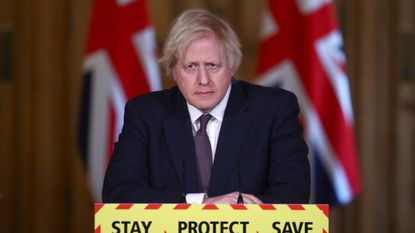‘We have crossed a line in surrendering our freedoms’
Your digest of analysis and commentary from the British and international press

- 1. Were we too ready to surrender our freedom?
- 2. Starmer's failure to shore up the Labour heartlands spells trouble ahead
- 3. MPs believe the scenes at Clapham Common are the best we can expect from the Met Police
- 4. Johnson wants to move on from Covid – 125,000 deaths shows why we need an inquiry
- 5. Germany’s vaccine debacle goes from bad to worse
1. Were we too ready to surrender our freedom?
Daniel Finkelstein in The Times
on government powers
“Having locked down the country for the best part of a year and suspended basic civil liberties once, we are far more likely to do it again”, writes Daniel Finkelstein in The Times. “We have crossed a line and it will stay crossed”, he adds. “Ensuring that the powers the government has granted itself are abolished rather than kept for a future occasion is going to be hard political work”, he adds. “As is ensuring that we set the bar very high for renewing such powers in the future.”
Subscribe to The Week
Escape your echo chamber. Get the facts behind the news, plus analysis from multiple perspectives.

Sign up for The Week's Free Newsletters
From our morning news briefing to a weekly Good News Newsletter, get the best of The Week delivered directly to your inbox.
From our morning news briefing to a weekly Good News Newsletter, get the best of The Week delivered directly to your inbox.
2. Starmer's failure to shore up the Labour heartlands spells trouble ahead
Tom Harris in The Telegraph
on the red wall
“The Hartlepool by-election will certainly be a major test” for Keir Starmer, says Tom Harris in The Telegraph. “But even a humiliating loss in a seat that has been Labour for most of the post-war years will not mean he has to be replaced at the top of his party.” “There is no appetite in the party for a fresh leadership contest and no obvious successor waiting in the wings”, Harris argues. More worrying for the party is that the Conservatives could even be a possible contender in what should be “natural Labour territory”. “Starmer must be thankful that a general election is still at least two years away.”
3. MPs believe the scenes at Clapham Common are the best we can expect from the Met Police
Stephen Bush in New Statesman
on policing problems
What has united the “average MPs” from both Labour and the Conservative Party “is an apparent acceptance that the scenes at Clapham Common are the best that either politicians or Londoners can expect from the Met Police”, says Stephen Bush in the New Statesman. The police force is used as a useful way to signal “Conservative toughness and Labour weakness, or Labour generosity and Conservative meanness”. That might suit the political ends of Johnson or Starmer, but “it has no value for anyone else”, Bush adds.
4. Johnson wants to move on from Covid – 125,000 deaths shows why we need an inquiry
Rafael Behr in The Guardian
on post-pandemic reckonings
“If there has been a ‘Johnson factor’ in Britain’s pandemic response it will not be recorded as the key to national salvation, even by generous biographers”, writes Rafael Behr in The Guardian. “Too many people have died who might have lived if different decisions had been taken”, he writes. But even so, “the prime minister wants the record of his failure overdubbed with celebration of his success”. The “urgency” in setting up an inquiry is “not to accelerate the settling of partisan scores”, but to “secure for posterity the foundations of fact on which the history of the pandemic will be written”.
5. Germany’s vaccine debacle goes from bad to worse
Constantin Eckner in The Spectator
on vaccine chaos
“Germany’s decision to stop using the AstraZeneca Covid vaccine has been condemned internationally”, writes Constantin Eckner in The Spectator. And “it has also gone down badly with Germans.” The country’s Health Minister Jens Spahn finds himself “under fire” and “did himself few favours” when he underlined how few cases of thrombosis had been linked to the jab. This week’s events “could well prove to be the final nail in the coffin” for Spahn’s political career, who only a few months ago was considered a potential candidate to succeed Angela Merkel. After the vaccine debacle, many Germans have concluded that Spahn “is simply not up to the job”.
Create an account with the same email registered to your subscription to unlock access.
Sign up for Today's Best Articles in your inbox
A free daily email with the biggest news stories of the day – and the best features from TheWeek.com
-
 Nigeria's worsening rate of maternal mortality
Nigeria's worsening rate of maternal mortalityUnder the radar Economic crisis is making hospitals unaffordable, with women increasingly not receiving the care they need
By Harriet Marsden, The Week UK Published
-
 'Elevating Earth Day into a national holiday is not radical — it's practical'
'Elevating Earth Day into a national holiday is not radical — it's practical'Instant Opinion Opinion, comment and editorials of the day
By Harold Maass, The Week US Published
-
 UAW scores historic win in South at VW plant
UAW scores historic win in South at VW plantSpeed Read Volkswagen workers in Tennessee have voted to join the United Auto Workers union
By Peter Weber, The Week US Published
-
 ‘Irony’ as Zoom calls staff back to office
‘Irony’ as Zoom calls staff back to officefeature And other stories from the stranger side of life
By Chas Newkey-Burden Published
-
 The U.S. veterinarian shortage crisis
The U.S. veterinarian shortage crisisSpeed Read With an anticipated shortage of 15,000 vets by 2030, it will be harder to get care for pets
By Catherine Garcia Published
-
 Company teaches mask-wearers to smile again
Company teaches mask-wearers to smile againfeature And other stories from the stranger side of life
By Chas Newkey-Burden Published
-
 Global happiness has been 'remarkably resilient' over the past three years
Global happiness has been 'remarkably resilient' over the past three yearsfeature
By Devika Rao Published
-
 Ministers considered killing all cats during pandemic
Ministers considered killing all cats during pandemicfeature And other stories from the stranger side of life
By Chas Newkey-Burden Published
-
 North Korea imposes 5-day lockdown on capital to fight 'respiratory illness'
North Korea imposes 5-day lockdown on capital to fight 'respiratory illness'Speed Read
By Brigid Kennedy Published
-
 China to begin re-issuing passports in another reversal of COVID lockdowns
China to begin re-issuing passports in another reversal of COVID lockdownsSpeed Read
By Justin Klawans Published
-
 The Week Unwrapped: Tracking apps, BTS and stay-at-home girlfriends
The Week Unwrapped: Tracking apps, BTS and stay-at-home girlfriendspodcast Does China’s U-turn mark the end of Covid-tracking apps? Has South Korean pop passed its peak? And are we really seeing the rise of the stay-at-home girlfriend?
By The Week Staff Published